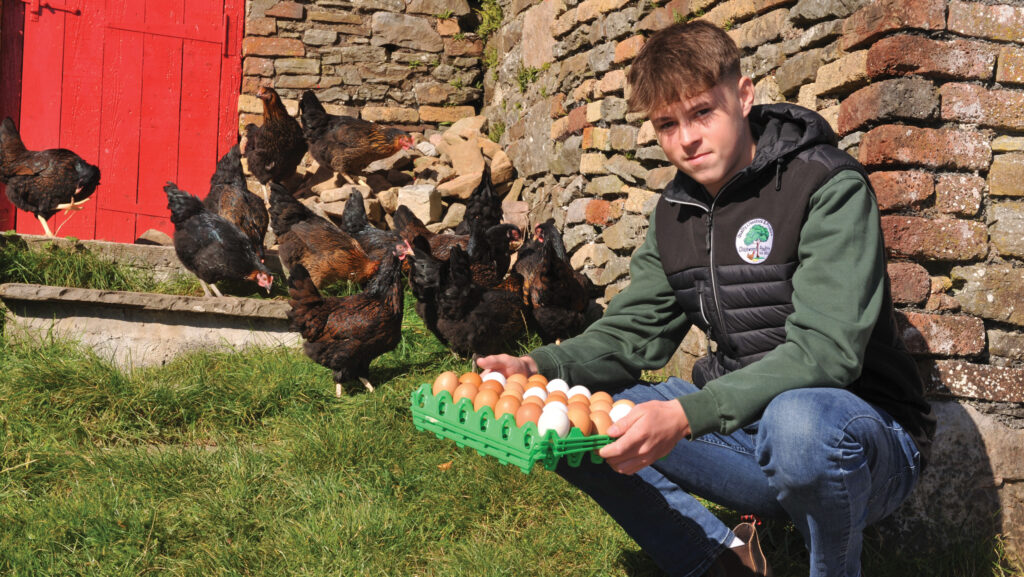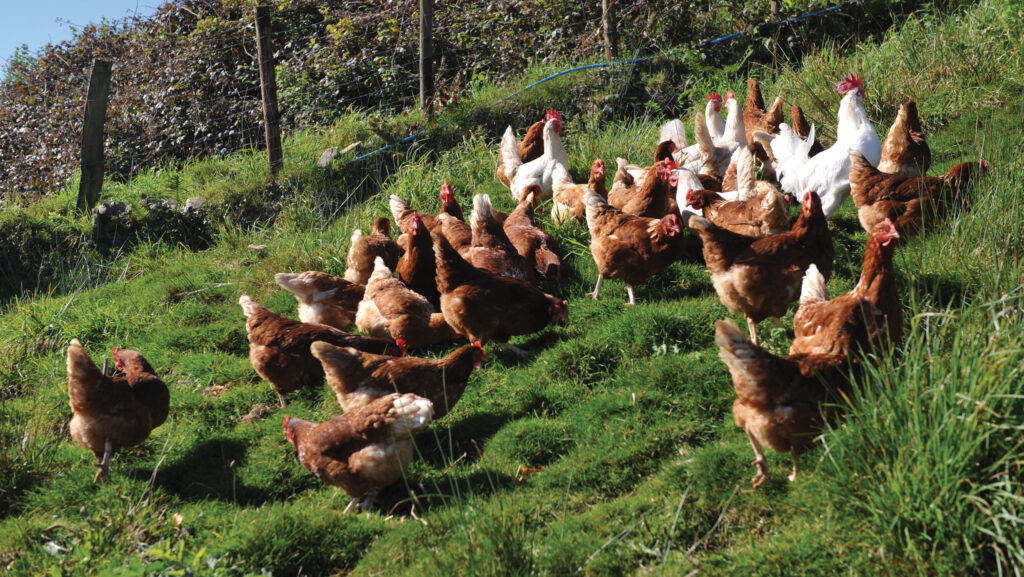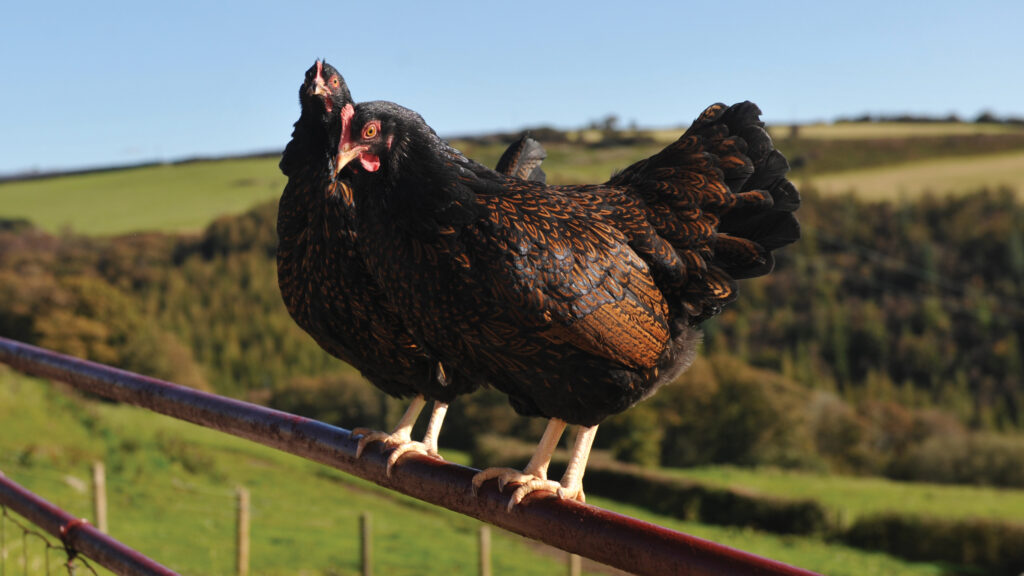Tips for new entrants from a 16-year-old entrepreneur
 Lewis Thomas with Australorps and eggs © Debbie James
Lewis Thomas with Australorps and eggs © Debbie James Starting a new farming enterprise can be challenging at any age.
Lewis Thomas was just 13 when he launched his own business, producing free-range eggs from a flock of layers at his family’s farm in Carmarthenshire.
See also: Farmers Weekly Awards 2025: Young Farmer of the Year
Three years on and Lewis has not only grown the business but diversified, building up numbers of rare-breed birds to supply fertilised eggs to the hatching market, and produce live birds for pullet and point-of-lay customers.
At 16, his business is small-scale but profitable. He currently has about 250 hens and is growing numbers year-on-year, juggling this while studying full-time for an agricultural qualification at Gelli Aur College.
Managing that flock has introduced him to commercial farming and fuelled his ambition to try to re-establish a dairy or beef herd at the 55ha (136-acre) farm owned by his grandparents, Gwynfor and Jacqueline Lewis.
Since establishing Chickwood Poultry (Chickwood is an English translation of part of the farm name, Coed Cyw Fawr), Lewis has acquired husbandry skills and commercial knowledge to drive his business forward.
He shares what he has learned and offers advice for other new entrants.
1 Start with a low-investment, high-margin enterprise
There is a big difference in the profit margin between eggs for hatching and eating – £2/egg compared with 29p.
In 2024, I sold 1,500 hatching eggs and had weekly sales of about 350 free-range eggs to friends and family.
The best returns from the hatching market are in rare-breed eggs, so I’ve invested in that market with Australorps and Copper Marans and will add Gold Laced Barnevelders, Blue Laced Wyandotte and Splash Australorps next year.
I also keep Warrens and White Leghorns because they are very good layers.
Any loss impacts on profit – losing a £20 hen when I was starting out was a lot of money.
But the financial hit from losing one bird compared with a beef animal at £1,000 is significantly less, so poultry is a good place for a new entrant to build up capital.
Chickens are relatively low risk, but teach you everything you need to know about business.

White Leghorns and Warrens © Debbie James
A poultry enterprise is scaleable, and the skills you learn are transferrable to other farming sectors, because they give you an understanding of profit and loss, profit margins, customer service, marketing, business development and growth and managing a crisis.
I have always wanted to farm, and while poultry might not continue to be my main enterprise, I think it will still be a source of interest, and a diversification too.
Even if it only brings in £10,000-£20,000 a year, it is additional income for a small farm where diversification is essential.
2 Take time to do research
Avoid making the same mistakes as others have done before you; research the subject and learn from what others have done wrong.
When I started out, I bought in a batch of hens but didn’t isolate them. They had a virus and died, and so did hens I already had.
If I had researched the risks, I would have known to keep them apart for three weeks. I won’t make that mistake again.
Don’t be frightened to ask others for advice. People are happy to share their knowledge.
It’s rare for me to buy in birds because I hatch my own but, occasionally, I will buy 100 or so day-old chicks to rear to point of lay to sell or to keep if I need to increase numbers.
Although the upfront cost is higher, with a chick costing about £4.65, they are guaranteed to be female, so you don’t get losses from producing cockerels when you incubate and hatch.
A mistake I made when I launched the business was to set the price point too low, because a rule of online groups is to not advertise prices.
Experience helps for pitching products at the right price.
3 Select an enterprise that interests you
I’ve had an interest in chickens since I was three or four years old, so from the very beginning I knew I’d enjoy it, that I’d be good at it.
It is better to have that interest and enjoyment in your business, because it will have more chance of succeeding.
4 Social media is key to generating sales
Many of my sales come via social media, and it’s important to be active on different platforms.
Some of my buyers will write posts or produce videos when their eggs or chicks arrive and share them. That creates a story and sales publicity.
About 60% were coming from eBay, until earlier this year it banned sales of fertilised eggs, and that has been a big loss.
Those customers are still out there somewhere though.There are a couple of new apps, and people are trying new things, but we don’t quite know yet how things will work out next year.

© Debbie James
I’ve got my own page on Facebook and have about 1,250 followers. The more you can push your own page the better, and I sell through Facebook Marketplace.
I had my first trade stand in August, at the local show at Pontardulais, and generated interest there.
It sparked an idea for a new marketing angle too, in the small family backyard setup, by offering a complete package with chickens, feed, and advice for six months.
5 Build a good reputation
I ask my customers to leave reviews and now have about 50, so when people enquire and look at my profile, they know I am genuine.
Age helps too, as people are genuinely impressed with a young person being in business and want to support you.
6 Enter awards
I recently won the Carmarthenshire Young Business Person of the Year Award and have been shortlisted for the 2025 Federation of Young Farmers’ Clubs Young Entrepreneur Award.
Winning and even entering awards provides spin-off opportunities, and you have to max that out.
7 Role models and mentors are valuable
My uncle David farmed here, but died when I was 13. He was my role model; I’d like to think he would be proud of what I am doing.
His pedigree dairy herd prefix was Chickwood, and this was his nickname at Young Farmers, so for me it was an obvious choice for my brand.
8 Cost of production is key
Nothing ever goes to waste, and that keeps my cost of production low.
I never have any losses from the hatching eggs because I sell all of them and have even had waiting lists of several weeks.
Even if I didn’t, I could hatch them myself and build up numbers.
Good equipment will keep production costs low too, because after that initial investment it will improve efficiency.
Last year, I spent £500 on a Brinsea incubator, even though you can buy a basic one for under £20, because getting the incubation right is so important for what I do.
